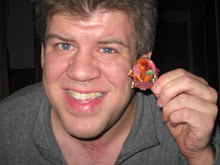Pixar reaches yet another milestone with its 13th feature: Brave is the studio's sneakiest movie.
The American trailers for Brave have only shown us about one-third of the story. Almost nothing from the movie's second half is shown, when the plot takes a very sharp left turn. Pixar's first fairy tale starts out a bit like Aladdin (disaffected princess bristles at being forced to marry), then becomes rather like The Little Mermaid (distraught princess unwisely turns to magic). This second, more mystical arc is the focus of Brave's Japanese trailer, which looks like a completely different movie. One could be forgiven for thinking that Brave might be a little schizoid.
But then comes the most dramatic, surprising turn of all. It completely threw me, and I was unprepared for it. I will not reveal what happens, but I will say that after the turn, Brave becomes very much like another Disney animated film - but not one of the princess movies. And about the plot, I will say nothing else.
Let me be very clear: I like Brave very much indeed. The second half worked for me after that left turn, once I realized where the story was going. I'm just not 100 percent convinced the movie took the right path to get there.
I spent so much of the second half trying to push "reset" in my head that when the big emotional climax came, I wasn't holding back sobs like I usually am at a Pixar movie. I merely got a little misty-eyed. And for an emotional pushover like me, that lack of a visceral reaction was striking. I felt like maybe Pixar pulled the rug out because it could - not because it should.
Much has been made of the fact that this is the stuido's first fairy tale, and the first with a female protagonist. And both are very welcome, refreshing changes. However, the second half of the movie is more typical of Pixar, in that it deals with themes of parental or paternal attachment, like Monster's Inc., Finding Nemo, The Incredibles and Up did. Not for nothing is Princess Merida the rare royal child who has two living parents.
Those parental themes are a double-edged sword, or maybe in this case a double-tipped arrow. The parents may make Brave more "typical" and less unique of Pixar - but it also gives their fairy tale a unique emotional strength at which the studio excels. The characters are all wonderfully drawn, in more ways than one, and the voice work is wonderful. It may shock some people to discover that the voice of Merida is Kelly Macdonald, known to most audiences as Josh Brolin's wife in No Country for Old Men - but it was the Coens film where the Scottish actress was not using her natural voice. Emma Thompson and Billy Conolly are also outstanding as Merida's mother and father.
And if for no other reason, Brave must be seen on a big screen in a movie theater, because this is the most gorgeous computer-animated film ever made, without question. Its widescreen lansdscapes are so lush and detailed, I often forgot the backgrounds were drawn in the computer too. And when I remembered that they were, I could only marvel at the achievement. Those backgrounds also stand out in Pixar's first truly immersive use of 3D.
Since last year's Cars 2 made it OK for critics to dislike a Pixar film, I fear that some reviewers are being a little too critical of the follow-up. True, I harbor a few reservations about Brave, whereas I usually love Pixar films unabashedly. But I still lived more than happily ever after in the end.
GRADE: A-
Thursday, June 21, 2012
Subscribe to:
Post Comments (Atom)

No comments:
Post a Comment